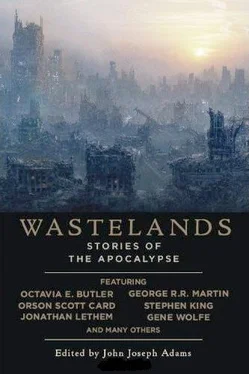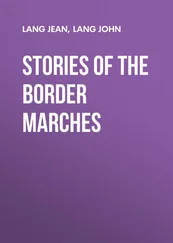In the early morning, three thirty, Wayne woke her for the second watch which Jackie spent sitting close to the fire, died to a heap of embers, wrapped in her sleeping bag, because the night had turned colder than she’d expected, colder than any recently (forecast of an early winter?), the rifle whose name she had meant to ask Wayne, to satisfy her curiosity, on the ground beside her; although every fifteen minutes or so she’d pick it up and sweep the end of the Bridge with the telescopic sight, Wayne’s rope trap jumping into focus, but all she saw were the couple of cars beyond the trap on the Bridge, whose lights continued their climb up and down the spectrum, blue to red to blue again-she checked
Wayne, too: asleep, so far as she could tell, in his sleeping bag-her dreaming still clinging to her, Jackie found herself, not for the first time, trying to imagine what had happened to him, speculating on the tectonic shifts in his psychic geography-he had refused to narrate what had taken place before he fled to her house, whose blood and gore had been spattered over him, but she knew that his mother stayed at home, and chances were good that his father and younger sister would have been there with her; since he wouldn’t answer her questions about any of them, it seemed likely that they were dead, that the Pack had burst in on Wayne and his family and torn them to pieces in front of him-which begged the question, How had he escaped? (not to mention, Where had the Pack come from in the first place?)—she suspected the answer was some variety of chance, dumb luck: maybe the Pack had come in through the back of Wayne’s house, allowing him to run out the front door; maybe he’d fallen down the basement stairs and been able to sneak out the garage; it was possible his father or mother had created a diversion, sacrificed themselves to allow him to reach his car—kind of trauma, combined with another close brush with the Pack in the form of the one that had killed Glenn, must have inaugurated some compensatory process, jury-rigged the freshly fractured fragments of his mind into an arrangement that would let him survive; and yes, she was aware that she was describing the un-plot of any number of super-heroes’ origins, the grievous psychic wound that gives rise to the costumed alter-ego, both answer to and continuing symptom of the trauma, but perhaps Wayne had reached for that template to keep what was left of his consciousness from flying off in all directions-how she wished she’d taken that class in Abnormal Psych this past semester, instead of putting it off for a future that hadn’t come; although, would anything she would have covered in an undergraduate class have equipped her for this? and, more to the point, what was she looking for? to understand Wayne, or to try to cure him, which would consist of what, exactly? returning him to the calm, talkative guy she’d known half a million years ago?—could she afford that? would that Wayne be able to help keep her and her baby safe the way this Wayne (whom she thought of sometimes as Batman and sometimes as the Shadow; although she mentioned neither name to him), who apparently remembered every trick and trap he’d read in Soldier of Fortune and the Getting Even books, had proven he could?—the question was rhetorical; though how much safer was she with someone whose personality continued to drift in darker directions (or whose secondary personality seemed to be subsuming his first)? someone who; what was the right word? possessed? was possessed by? whatever the oily shadow that had masked his face, stretched behind him like a cloak, was, because however much she’d done her best to convince herself that she’d undergone some variety of hallucination, she knew that wasn’t the case: she had seen what she’d seen, which she thought might have been drawn out from wherever it hid by his pain, by the stress of having to hold the flashlight on the wound Jackie had reopened and picked through—in the two and a half weeks since, she’d kept on the lookout for it, but the closest she’d come to seeing it again had been last week, when she’d awakened from yet another dream of Glenn’s dying scream to see Wayne leaning against the wall opposite her, an enormous shadow sprawling behind him-she’d sat up, heart jolting, only to discover it was a trick of the light (she thought)—so far, Wayne hadn’t shown the slightest sign that he knew that she knew; although, how could she be sure? and she wondered if he were even aware of the darkness shadowing him-it was funny: you would have thought that here, now, in the country of fundamental things, she would have been able to turn to Wayne and ask him what was going on, and he would be able to answer her as directly, but no, she couldn’t risk alienating him, making him feel she’d discovered a secret he wished to keep concealed, because what would she do if he abandoned her?—it was like when she’d learned definitely that she was pregnant, a pale blue plus confirming what her stomach had been telling her for weeks: you would have expected the gravity of the situation to have compelled her and Glenn, her and her parents, to talk about what mattered, but the opposite had been the case: Glenn hadn’t been able to bring himself to say anything, as if he were afraid that putting words to their situation would be an irretrievable admission on his part, and so had retreated behind vague assurances and trying to have sex even more, since there was no point in worrying about protection now, which she had gone along with, even if they were in his car in the parking lot of the community college, because at least it was contact-as for her parents, they had refused to follow their initial expressions of dismay and (reluctant) support with anything-ironically, it had been Glenn’s father, who had gone up one side of them and down the other, leaving the two of them in tears before ordering them the hell out of his house, and who had called at least once a week demanding to know what was going on, who seemed, in retrospect, the most honest of them all, the best able to express his feelings—no, the pressure of events didn’t make conversation any easier; if anything, it made significant communication almost exponentially more impossible—all Jackie could say with any surety was that Wayne’s shadow was connected to everything else, to the plague(s), the purple flowers, the Pack (which, to answer that other begged question, she had no explanation for: what they were, let alone where they’d come from; how they’d arrived in upstate New York pretty much overnight—in too many ways to count, they didn’t make sense; she had watched enough specials on Nature and Nova to know that predators this size and activity would require an enormous amount of food, which, as far as she could tell, was not available: she and Wayne had encountered only a handful of bodies in their travels [everyone else, she assumed, consumed by the virus she’d seen melting people’s faces on CNN, which must have continued its work right down to the bones; although that was another problem], hardly enough to sustain even the Pack’s reduced numbers, and they certainly didn’t appear to have much interest in vegetation; though it was possible, she supposed-nor was there much sense in them pursuing her and Wayne for as long as they had: neither of them would make much of a meal for the Pack, and surely the animals [?] should have learned to associate following them with pain and death-it was like being caught in one of those z-grade science fiction movies where spectacle and suspense trumped logic and consistency: Last Stand Against the Pack or somesuch), all of them pieces to a jigsaw they’d lost the box to-during the second to last day of the week of rain, when the sky had delivered itself with such force it had been impossible to see anything out of the windows of the house they’d sought shelter in (whose driveway was occupied by a minivan filled with the largest example of the purple flowers they’d encountered yet), and the roof had creaked ominously with each gust of the wind, she and Wayne had diverted themselves by inventing explanations for what had befallen the world, the more fanciful, the better: God had decided that the apocalypse proposed in Revelation wasn’t sufficiently au courant and so had pillaged paperback thrillers for something with more panache; monsters had broken through from the other side of the mirror, Alice’s Looking-Glass Land on acid; this world had intersected some other dimension, another Earth or even series of Earths, each of them radically different, and everything had become tangled (Wayne had coined the term "quantum rupture" for this scenario); the collective unconscious, the Spiritus Mundi, had burst, disgorging nightmares by the score-at one point, excited by what had felt like the resurgence of the old Wayne, the one with whom she could talk about anything, Jackie had tried to verbalize the feeling that had refused to abandon her since the catastrophes had begun: that somehow all of this was contingent, none of the changes that had contorted the world permanent, not yet—the best she could manage to explain the sensation was to compare it to the way she’d felt after her best girlfriend, Elaine Brown, had been killed by a drunk driver on her way home from her job at Dunkin’ Donuts the year before: for about a day after her parents had sat her down at the kitchen table to tell her, Jackie had been absolutely convinced that Elaine’s death was not yet set in stone, that there was some way for her to change things, if only she could figure out what it was-she’d been in shock, yes, but it was as if that blow to her system had brought her temporarily closer to the machinery of the world, allowed her to feel the peeling away of this course of events from other possibilities—the sensation she had now was different mostly in terms of magnitude and duration: when Elaine had been killed, it had been like standing next to a small motor, a motorcycle, say, for twenty-four hours or so; this was like standing beside railroad tracks while a three-engine freight train rumbled past, night and day, for weeks—Wayne had named the feeling "quantum divergence," (an awful lot of quanta flying around that day), which sounded impressive but didn’t really mean what he wanted it to—it was, Jackie said, like being able to feel the Fates changing the weave of the world-whatever name you gave her awareness, whether it was anything more than a peculiar effect of profound shock, a milder version of the transformations that were altering Wayne (for all she knew, it was a well-documented response to trauma), the problem with her conviction of the freight train of events rattling away from alternate scenarios was its utter useless-ness: after all, what could she do about it? it wasn’t as if she had the ability to reverse events, to cause the Fates to loosen what they’d woven and start again (though secretly she wondered if, somewhere, there might be a door that would open back to the world she’d known)—his attempt at naming it aside, Wayne hadn’t known what to say to her sensation, and the conversation had moved on to other topics, to the baby, and how much longer till Jackie was due, and what were they going to do when she was ready to give birth?—at the time, she’d hoped they’d be able to use the facilities at Vassar Hospital, at which, at the rate they were going, she projected they’d arrive around the time the baby was about to come, and if the Pack had been defeated, killed by then, there would be no reason they couldn’t set up camp in it; there was a lot to be said for staying in a hospital-but they had fled up Route 9 faster than she’d anticipated; the Pack had proven more wily and ever-more-difficult to kill, and now they would have to try one of the hospitals in Kingston (if there were any point to it; if the baby were still alive; if her body didn’t go into labor before then and deliver a stillborn child)—Enough, she thought, one hand rubbing her stomach in broad circles, as if it were a lamp and she summoning the genie; Be all right, she told the baby, be all right-funny, how much you could want something that intimidated the hell out of you, that you hadn’t wanted in the first place but had felt powerless to refuse (thank you, twelve years of Catholic school), that had wrenched the wheel from your hands and turned your life onto an unexpected, unpaved road; talk about quantum divergence-she remembered the first time she’d felt the baby move, the first time she’d been sure, a flutter that had simultaneously freaked her out and thrilled her, and which had grown into kicks and jabs and using her bladder as a personal trampoline—the emotion that had grown up in response to her pregnancy had been different than what she’d expected: there had been none of the treacly sentimentality she’d been sure would ooze through her; instead, what had sprouted in her had been more basic, primitive, even, a deep connection to the child pushing out her belly, as if she could feel the umbilicus tying them together—the emotion had been supplemented by others: anxiety, mostly, and teary pathos, and occasionally profound contentment, as solid and heavy as a stone— Be all right , she told the baby, be all right .
Читать дальше












